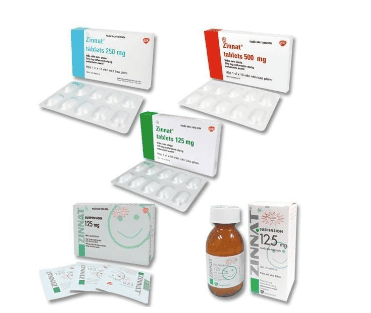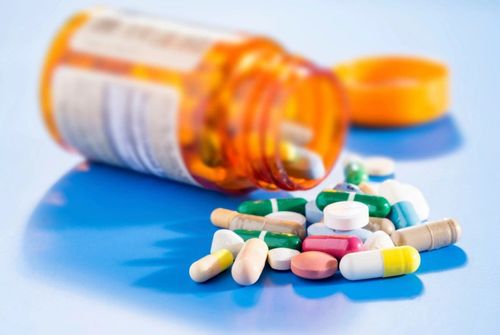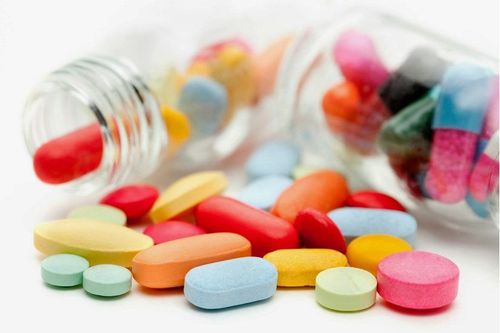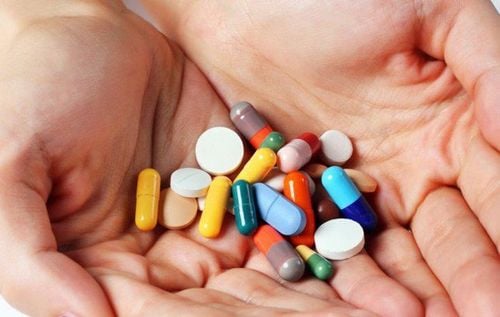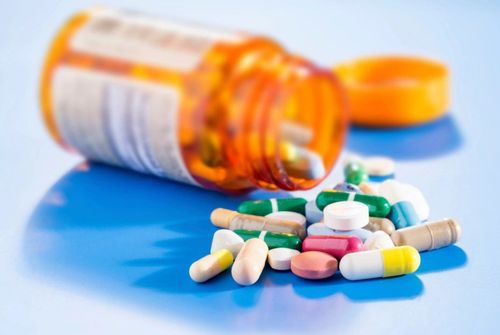This is an automatically translated article.
Lefxacin tablet has an antibiotic as the main ingredient. It is used to treat certain bacterial infections including acute sinusitis, H. pylori pneumonia, urinary tract infections, chronic prostatitis, and certain types of gastroenteritis.
1. What is the effect of Lefxacin tablet?
Lefxacin tablet has the main ingredient is Levofloxacin hemihydrate belonging to the group of antiparasitic, anti-infective, antiviral, antifungal. The drug is indicated for use in the treatment of infections caused by bacteria sensitive to levofloxacin, such as:Acute sinusitis Exacerbation of chronic bronchitis. Community-acquired pneumonia Prostatitis Uncomplicated or complicated urinary tract infections. Skin and subcutaneous tissue infections with or without complications. Post-exposure prophylaxis and treatment of anthrax In combination with other antibiotics used to treat tuberculosis, meningitis or pelvic inflammatory disease.
2. Dosage and how to use Lefxacin tablet
2.1. How to use The drug is used via drug, the absorption of levofloxacin into the body is not affected by food, so the patient can take the drug before or after eating. Do not use antacids containing aluminum and magnesium, preparations containing heavy metals such as iron and zinc, sucrafat, didanosine within 2 hours after using Lefxacin tablet.
2.2. Dosage Dosage for adults:
In the treatment of respiratory infections:
Exacerbation of chronic bronchitis use 500 mg, taken once a day, for a long time. 7 days. In the treatment of community-acquired pneumonia, a dose of 500mg is used, 1-2 times a day, for a duration of 7-14 days. In the treatment of acute maxillary sinusitis with a dose of 500 mg, once a day for 10-14 days. In the treatment of infections of the skin and subcutaneous tissue
In case of complications, the dose is 750 mg, taken once a day for 7-14 days. For uncomplicated cases, use 500mg, once a day, for 7-10 days. In the treatment of urinary tract infections
When having complications, use 250mg, 1 time / day for 10 days and in uncomplicated cases, the drug dosage is 250mg, 1 time / day for 3 days. In the treatment of acute pyelonephritis, a dose of 250 mg is used, once a day for 10 days. Prophylactic treatment after exposure to anthrax bacilli: Once a day, 500 mg, used for 8 weeks.
Treatment of anthrax: Use the drug for intravenous infusion, then use it orally when the patient's condition allows with a dose of 500 mg, once a day, for a duration of 8 weeks.
Treatment of prostatitis: 500mg/time/day for 28 days.
For patients with renal impairment : Dosage adjustment depends on creatinine clearance. Specifically:
In case of renal failure patients with complicated urinary tract infections, acute pyelonephritis, creatinine clearance above 20 ml/min, the initial dose is 250 mg, the maintenance dose is 250 mg. every 24 hours. Creatinine clearance between 10-19 ml/min using an initial dose of 250 mg, a maintenance dose of 250 mg every 48 hours. Other indications: Creatinine clearance from 50-80 without dosage adjustment Creatinine clearance from 20-49 ml/min using initial dose of 500 mg, maintenance dose is 125 mg every 24 hours. Creatinine clearance between 10-19 ml/min using an initial dose of 500 mg, a maintenance dose of 125 mg every 24 hours. Hemodialysis uses initial dose of 500 mg, maintenance dose is 125 mg every 24 hours Continuous peritoneal dialysis uses initial dose of 500 mg, maintenance dose is 125 mg every 24 hours Dosage for patients with hepatic impairment : No need to adjust the dose in case of liver failure, apply drug dosage as for normal patients
3. Contraindications to Lefxacin tablets
Lefxacin tablet is contraindicated in the following cases:
People with a history of hypersensitivity to levofloxacin, to other quinolones, or to any other ingredient of the drug. People with epilepsy. Patients with G6PD deficiency. History of tendon disease caused by fluoroquinolone antibiotics. Children under 18 years old.
4. Be careful when using Lefxacin tablet
With caution to use Lefxacin tablet in the following cases:
For pregnant women: Doctors recommend not using levofloxacin for pregnant women, because currently there are not enough data to prove the drug's safety for the fetus. pediatric. Lactation: Levofloxacin may be excreted in human milk, although levofloxacin concentrations are relatively low, but because of the potential risk to the baby, the drug is not recommended for use in nursing mothers. . Effects on the musculoskeletal system: Levofloxacin, like most other quinolones, can cause cartilage degeneration in weight-bearing joints in many young animals. Therefore, levofloxacin should not be used in children under 18 years of age. Myasthenia gravis: Caution should be exercised in patients with myasthenia gravis, as symptoms may be aggravated. Peripheral neuropathy: Some patients after taking Lefxacin tablet have experienced some reactions such as polyneuropathy or paresthesia, hypoesthesia, dysesthesia and weakness in patients taking levofloxacin. Levofloxacin should be discontinued if the patient develops symptoms of polyneuropathy including pain, burning sensation, and nerve throbbing. Hypersensitivity reactions: Hypersensitivity reactions with many other clinical manifestations, even anaphylaxis when using Lefxacin tablet. Patients should stop using the drug at the first signs of hypersensitivity reactions and notify the doctor for appropriate treatment. Central Nervous System Effects: There have been reports of patients experiencing central nervous system problems after taking the drug, such as psychosis, increased intracranial pressure, and nervous excitability. central nervous system leading to convulsions, tremors, restlessness, headache, insomnia, depression, confusion, hallucinations, suicidal behavior... If these adverse reactions occur while taking levofloxacin, Patients should stop taking the drug and take appropriate measures to manage symptoms. Careful use of the drug is required for people with diseases related to the central nervous system such as epilepsy, cerebral vascular sclerosis, ... because it may increase the risk of convulsions. Tendon Effects: Rupture of the Achilles tendon, arm, shoulder or other tendons or long-term disability has been reported in patients receiving quinolones, including levofloxacin. Levofloxacin should be discontinued if the patient experiences pain, inflammation, or tendon rupture. Patients should rest and limit exercise until the diagnosis is clear of tendon involvement or tendon rupture. Tendon ruptures may develop during or after levofloxacin therapy. Disturbances in blood glucose: Common in diabetic patients treated concomitantly with Lefxacin tablet with oral hypoglycemic agents (eg, glyburide/glibenelamide) or insulin. In these patients, blood glucose levels should be carefully monitored. If hypoglycaemic reactions occur in a patient treated with levofloxacin, levofloxacin should be discontinued immediately and appropriate other drug therapy instituted.
5. Side effects when using Lefxacin tablet
While using Lefxacin tablet, patients may experience some of the following side effects:
Some common side effects that patients may experience include nausea, headache, diarrhea. , insomnia, constipation. Other less common reactions include abdominal pain, dizziness, vomiting, dyspepsia, vaginitis, rash, chest pain, itching, sinusitis, shortness of breath, fatigue, flatulence, pain, back pain, inflammation. throat. Rare reactions such as ascites, allergic reactions, asthenia, edema, fever, headache, flu-like symptoms, malaise, syncope, double sensation of temperature. Cardiovascular reactions such as heart failure, hypertension, hypotension, orthostatic hypotension. Central and Peripheral Nervous System Disorders: Convulsions (epilepsy), dysphonia, hyperesthesia, hyperactivity, hypertonia, hypoesthesia, involuntary muscle contractions, migraine, paresthesias, paralysis, speech disorder, tremor, facial flushing, encephalopathy, ataxia. Digestive system disorders: Dry mouth, dysphagia, esophagitis, gastritis, gastroenteritis, gastroesophageal reflux, glossitis, hemorrhoids, intestinal obstruction, pancreatitis, stomatitis. Vestibular and hearing disorders: Ear pain, tinnitus. Liver and biliary disorders: Affects liver function, causing cholecystitis, gallstones, increased bilirubin, increased liver enzymes, liver failure, jaundice.
6. Drug interactions
Antacids, sucralft, metal cations, multivifamine: Concomitant administration of Lefxacin tablet with antacids containing magnesium or aluminum, as well as sucralfate, metal cations such as iron and multivitamins with zinc may affect the absorption absorption of levofloxacin, causing blood levels to be much lower than normal. Therefore, patients should take these drugs at least two hours before or after taking levofloxacin.
Theophylline: Concomitant use of other quinolones with theophylline causes a prolongation of the half-life, an increase in serum theophylline concentrations, and an increased risk of theophylline-related adverse events. Therefore, theophylline concentrations should be closely monitored and the dose adjusted appropriately when co-administered with levofloxacin. Warfarin: The levofloxacin ingredient in Lefxacin tablets has the potential to increase the effects of warfarin. Prothrombin time or other appropriate anticoagulation tests should be closely monitored if levofloxacin is co-administered with warfarin. Patients should also be monitored for signs of bleeding. Cyclosporin: Clinical studies have shown that there is no significant effect of levofloxacin on plasma, AUC and other eyelosporin parameters. Therefore, no dose adjustment of levofloxacin or cyclosporin is required when these two drugs are administered concomitantly. Digoxin: Levofloxacin does not affect the absorption of Digoxin. Therefore, no dose adjustment of levofloxacin or digoxin is required when used in combination. Probenecid and Cimetidine: In a clinical study in healthy subjects, the effect of probenecid or cimetidine on the rate and extent of absorption of levofloxacin was insignificant. In short, Lefxacin tablet has an antibiotic as the main ingredient. It is used to treat certain bacterial infections. To ensure the effectiveness of treatment and avoid unwanted side effects, patients need to strictly follow the instructions of the doctor, professional pharmacist.
Follow Vinmec International General Hospital website to get more health, nutrition and beauty information to protect the health of yourself and your loved ones in your family.
Please dial HOTLINE for more information or register for an appointment HERE. Download MyVinmec app to make appointments faster and to manage your bookings easily.




